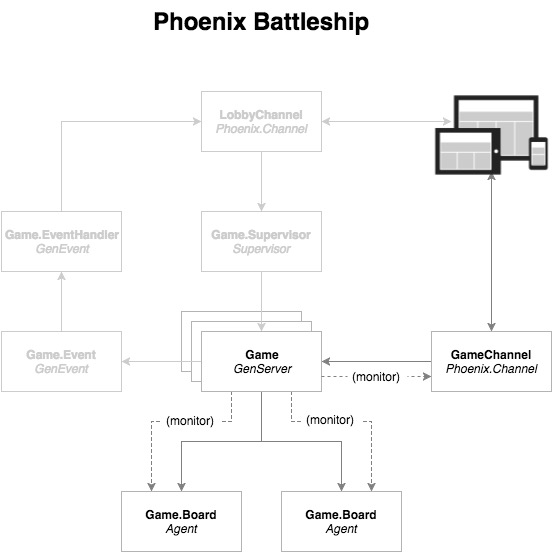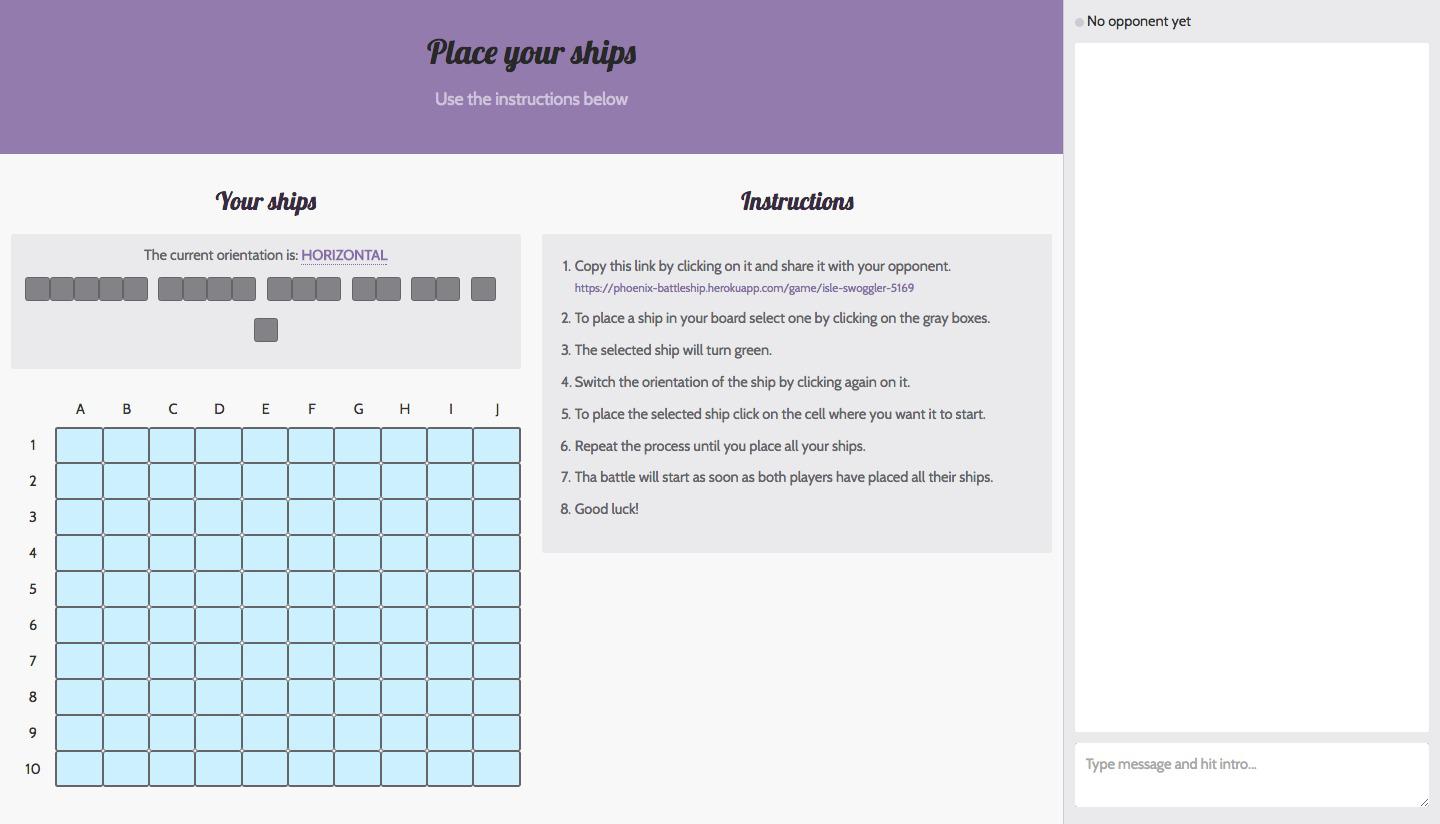This post belongs to the Building Phoenix Battleship series.
The game setup
In the previous part of the series, we described both the LobbyChannel and the Battleship.Game.Supervisor modules and their responsibilities within the application. These responsibilities include creating new Battleship.Game processes, supervising them and making their current state available for any visitor. After having this clear, now we can move on to the following elements of the diagram:

Recalling the last post, the player joins the LobbyChannel when visiting the game’s lobby page. When he clicks the Start new battle button, a new message is pushed through the socket to the channel and a new Battleship.Game supervised process is created by the Battleship.Game.Supervisor, returning the game’s id. Finally, the player gets redirected to the battle screen, where the setup phase starts.

Joining a game
To add this new channel to the project, we need to update the player_socket.exs
file again in to add the channel’s module and its topic:
# web/channels/player_socket.ex
defmodule Battleship.PlayerSocket do
@moduledoc """
Player socket
"""
use Phoenix.Socket
alias Battleship.Player
## Channels
channel "lobby", Battleship.LobbyChannel
channel "game:*", Battleship.GameChannel
# ...
# ...
end
Now we have the Battleship.GameChannel listening to topics following the game:* pattern.
Let’s add the module and write the join function:
# web/channels/game_channel.ex
defmodule Battleship.GameChannel do
use Phoenix.Channel
alias Battleship.Game
def join("game:" <> game_id, _message, socket) do
player_id = socket.assigns.player_id
case Game.join(game_id, player_id, socket.channel_pid) do
{:ok, _pid} ->
{:ok, assign(socket, :game_id, game_id)}
{:error, reason} ->
{:error, %{reason: reason}}
end
end
# ...
end
When the player tries to join the channel, we use the game_id from the topic, his player_id and
the channel’s pid to try joining the previously created game. If joining the game returns
a tuple containing {:ok, _pid} the join is successful, and the game_id gets assigned to
the socket. Otherwise, an error is returned through the socket to the player’s browser.
Let’s take a look to the Battleship.Game module and its core functionality:
# lib/battleship/game.ex
defmodule Battleship.Game do
use GenServer
defstruct [
id: nil,
attacker: nil,
defender: nil,
turns: [],
over: false,
winner: nil
]
# CLIENT
def start_link(id) do
GenServer.start_link(__MODULE__, id, name: ref(id))
end
# ...
# SERVER
def init(id) do
{:ok, %__MODULE__{id: id}}
end
# ...
defp ref(id), do: {:global, {:game, id}}
defp try_call(id, message) do
case GenServer.whereis(ref(id)) do
nil ->
{:error, "Game does not exist"}
pid ->
GenServer.call(pid, message)
end
end
end
When the Battleship.Game.Supervisor creates a new Battleship.Game process, the init
function is called after start_link, setting the defined struct as the initial state
of the process. This state contains the id of the game (previously generated from the LobbyChannel),
the attacker’s id, the defender’s id, a list of the shooting turns results, a flag to
set whether the game is over or not and the winner’s id. Let’s add the join function
called in the GameChannel:
# lib/battleship/game.ex
defmodule Battleship.Game do
use GenServer
alias Battleship.Game.Board
#...
# CLIENT
def join(id, player_id, pid), do: try_call(id, {:join, player_id, pid})
# ...
# SERVER
def handle_call({:join, player_id, pid}, _from, game) do
cond do
game.attacker != nil and game.defender != nil ->
{:reply, {:error, "No more players allowed"}, game}
Enum.member?([game.attacker, game.defender], player_id) ->
{:reply, {:ok, self}, game}
true ->
Process.flag(:trap_exit, true)
Process.monitor(pid)
{:ok, board_pid} = create_board(player_id)
Process.monitor(board_pid)
game = add_player(game, player_id)
{:reply, {:ok, self}, game}
end
end
defp create_board(player_id), do: Board.create(player_id)
defp add_player(%__MODULE__{attacker: nil} = game, player_id), do: %{game | attacker: player_id}
defp add_player(%__MODULE__{defender: nil} = game, player_id), do: %{game | defender: player_id}
end
A lot going on in the join process, so let’s go step by step. When the join client
function is called from the Battleship.GameChannel, this tries to send a :join call message to the
game process identified by {:global, {:game, id} passing the player_id and the channel pid.
If the game process exists, it handles the {:join, player_id, pid} message which checks the
following conditions:
-
If both the
attackerand thedefenderid’s are set, it replies an error with the reason “No more players allowed”. This way we ensure that only two players can join a single game. -
If the
player_idequals theattackeror thedefender, it returns the current state, meaning that the player already joined previously. -
If none of the above, it first sets the process
trap_exitto true and monitors the player’s game channelpid. By doing this, the game process can capture exit and termination messages from other processes, in this case, the player’s game channel process (we are going to talk about this in the next part). It continues creating a newBattleship.Game.Boardprocess for the joined player and monitors it as well. Finally, it adds theplayer_idto its state struct (depending on which player is already set) and returns a{:ok, self}tuple.
Creating a player’s board
As we have seen, when a player joins a game successfully, a new game board is built for this particular player. This is its very basic implementation:
# lib/battleship/game/board.ex
defmodule Battleship.Game.Board do
defstruct [
player_id: nil,
ships: [],
grid: %{},
ready: false,
hit_points: 0
]
end
Its struct consists of the owner’s player_id, a list of the placed ships, the
board grid where it is going store the ships positions and the opponent’s shooting results,
a flag to mark whether the board is ready to begin the battle or not and the remaining
hit_points. We need to store two of these structs (one for each player) as part of the
game’s state, but where shall we store it? As we already have the game’s generic
server process state, it looks like the ideal place to store them, but instead of
doing so we are going to store them in two separate processes using Elixir’s Agent
abstraction around state. In other words, we are going to create two simple server
processes to store both boards state, using the Agent API to access and update them.
Let’s start by defining the create/1 function called from the board:
# lib/battleship/game/board.ex
defmodule Battleship.Game.Board do
alias Battleship.{Ship}
@ships_sizes [5, 4, 3, 2, 2, 1, 1]
defstruct [
player_id: nil,
ships: [],
grid: %{},
ready: false,
hit_points: 0
]
def create(player_id) do
grid = build_grid
ships = Enum.map(@ships_sizes, &(%Ship{size: &1}))
Agent.start(fn -> %__MODULE__{player_id: player_id, grid: grid, ships: ships} end, name: ref(player_id))
end
def get_data(player_id) do
Agent.get(ref(player_id), &(&1))
end
defp ref(player_id), do: {:global, {:board, player_id}}
end
The create/1 function receives a player id. It builds the grid, creates the ships list and
starts a new Agent process setting as its initial state a Board struct with the
player_id, the generated grid, and the ships list. As we want to access
to this process’s state by its player_id like in the get_data/1 function, for instance,
we also set the name parameter globally with a {:global, {:board, player_id}} value.
Have you noticed the similarities with GenServer so far? Let’s implement the
build_grid function:
# lib/battleship/game/board.ex
defmodule Battleship.Game.Board do
# ...
@size 10
@orientations [:horizontal, :vertical]
@grid_value_water "·"
@grid_value_ship "/"
@grid_value_water_hit "O"
@grid_value_ship_hit "*"
# ...
defp build_grid do
0..@size - 1
|> Enum.reduce([], &build_rows/2)
|> List.flatten
|> Enum.reduce(%{}, fn item, acc -> Map.put(acc, item, @grid_value_water) end)
end
defp build_rows(y, rows) do
row = 0..@size - 1
|> Enum.reduce(rows, fn x, col -> [Enum.join([y, x], "") | col] end)
[row | rows]
end
end
My first approach was to build a multidimensional list to represent the grid, but
due to Elixir’s immutability, updating such list was very tricky, so I finally opted
for using a Map. Using the @size value as the maximum value of rows and columns
for the grid it generates a map that looks like this:
%{
"00" => "·", # A1
"01" => "·", # B1
"02" => "·", # C1
"03" => "·", # D1
"04" => "·", # E1
# ..
"99" => "·" # J10
}The keys represent a cell of the grid, and the values the content of the grid, which can be:
-
@grid_value_wateris the default value, which means water. -
@grid_value_shiprepresents a portion of a ship. -
@grid_value_water_hitrepresents that the opponent shot this cell hitting water. -
@grid_value_ship_hitsame as the previous one but hitting one of the board’s ships.
One of the direct benefits of using a map like this, instead of a multidimensional list, is that updating it is as simple as doing the following:
grid = %{grid | "01" => @grid_value_water_hit}
# or...
grid = Map.put(grid, "01", @grid_value_water_hit)
# or even...
grid = put_in(grid, ["01"], @grid_value_water_hit)Easy as pie and pretty straightforward, isn’t it?
Returning the game state
Now that the player has joined the new game,
his board has been created, and the browser has received the success message,
it has to notify the other player by pushing a game:joined message
through the GameChannel. Let’s implement this handle:
# web/channels/game_channel.ex
defmodule Battleship.GameChannel do
use Phoenix.Channel
# ...
def handle_in("game:joined", _message, socket) do
player_id = socket.assigns.player_id
board = Board.get_opponents_data(player_id)
broadcast! socket, "game:player_joined", %{player_id: player_id, board: board}
{:noreply, socket}
end
# ...
end
Taking the assigned player_id it calls Board.get_opponents_data(player_id) to get the
opponents board and broadcast it through the socket. By doing this, it stores
the opponent’s board in the Redux store, in case the opponent joined before him.
But why is it using Board.get_opponents_data/1 instead of Board.get_data/1?
# lib/battleship/game/board.ex
defmodule Battleship.Game.Board do
# ...
def get_opponents_data(player_id) do
board = Agent.get(ref(player_id), &(&1))
new_grid = board
|> Map.get(:grid)
|> Enum.reduce(%{}, fn({coords, value}, acc) -> Map.put(acc, coords, opponent_grid_value(value)) end)
%{board | ships: nil, grid: new_grid}
end
defp opponent_grid_value(@grid_value_ship), do: @grid_value_water
defp opponent_grid_value(value), do: value
# ...
end
As it sends the opponent’s board to both players, we need to create a
public version of it. We do not want cheaters to check the JavaScript console and
know where his opponent has placed the ships. What this function basically does is
getting the opponent’s board state, update all the cells that have a grid_value_ship value
with a grid_value_water value and remove the ship list.
Any time a player needs to get the game state it pushes a game:get_data to the
GameChannel so let’s implement it:
# lib/battleship/game.ex
defmodule Battleship.Game do
use GenServer
# ...
def handle_call(:get_data, _from, game), do: {:reply, game, game}
def handle_call({:get_data, player_id}, _from, game) do
game_data = Map.put(game, :my_board, Board.get_data(player_id))
opponent_id = get_opponents_id(game, player_id)
if opponent_id != nil do
game_data = Map.put(game_data, :opponents_board, Board.get_opponents_data(opponent_id))
end
{:reply, game_data, game}
end
def get_opponents_id(%__MODULE__{attacker: player_id, defender: nil}, player_id), do: nil
def get_opponents_id(%__MODULE__{attacker: player_id, defender: defender}, player_id), do: defender
def get_opponents_id(%__MODULE__{attacker: attacker, defender: player_id}, player_id), do: attacker
# ...
end
The Game module handles two different :get_data messages. The first one, which
doesn’t receive a player_id, simply replies with the game state. On the other hand,
the second one which receives the player_id and which is the one being called from the
GameChannel, it does something a little more complex. First, it creates
a new game_data map by adding the :my_board key with the player’s board to the game
state. Then it gets the opponent’s id from the game’s state using the passed player_id.
If it is not null, or in other words, if the opponent already joined the game, if
updates the game_data map a adding the :opponents_board and as value the result of
calling Board.get_opponents_data(opponent_id). Finally it replies the game_data map.
That is all for now. In the next part, we are going to code the functionality related to placing ships, sending chat messages and handling possile errors thanks to OTP. Meanwhile, feel free to checkout the final (but still in progress, though) source code or challenge a friend to a battleship game.
Happy coding!
